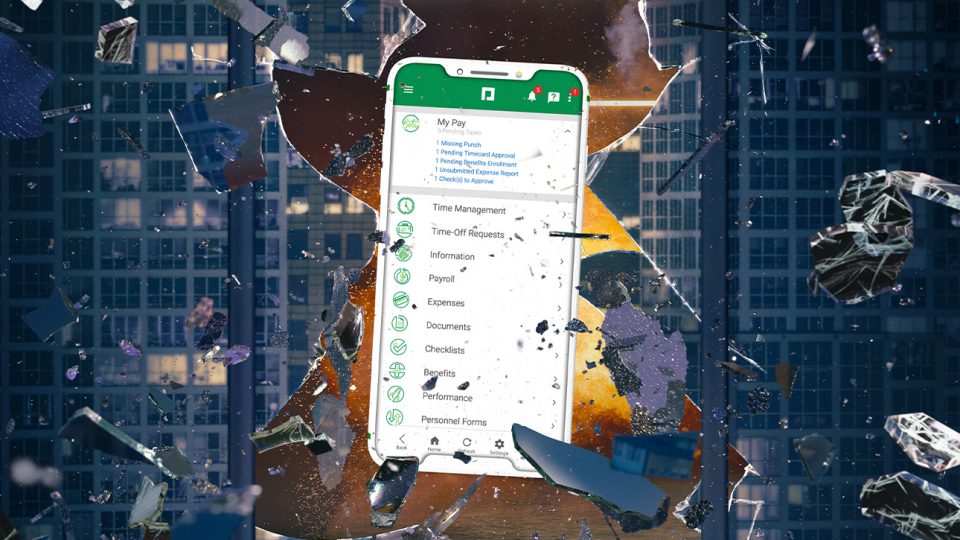Unnecessary Action Hero is my name; eliminating unnecessary HR and payroll hassles is my game.
And as long as businesses keep using clunky tech and outdated processes, I’ll always be needed.
Job security for me. Frustration for everyone else.
It’s alarming how difficult life can be for employees when they’re kept in the dark about their own HR and payroll information. I see it all the time.
Every day, I embark on unnecessarily daring missions to get employees out of unnecessary jams. Whether I’m combat-rolling into a living room to solve a PTO problem or rappelling from a helicopter to save someone stranded by a payroll error, the reason is always the same: They don’t have access to their personal data.
Imagine needing medical attention, but your insurance deduction was never applied to payroll. Or going on vacation only to find you’ve been shorted on your check. Or having to chase down someone in HR just to correct your direct deposit info.
The solution? Letting employees use self-service tech to access, update and manage their own HR data while getting a jump on payroll errors.
As simple as that sounds, some people still aren’t on board. In fact, many of them think if employees did their own payroll, they’d just pay themselves whatever they want. Which is ridiculous since what it really does is make everyone’s lives easier.
Talk about unnecessary
What do I mean? An employee’s pay information and HR data aren’t privileged information. It’s theirs to view and control as needed.
Unless you want to waste HR’s time, there’s no point in assigning them as gatekeepers of that info. Shouldn’t HR focus on engagement and the overall employee experience anyway?
Besides, if employees were guided to find and fix payroll errors themselves, accuracy would be assured and HR wouldn’t have to deal with unnecessary repercussions, like:
- voids
- direct-deposit reversals
- manual checks
- or other stressful corrections
It seems there are misconceptions about what employees should do on their own and, more significantly, what they’re willing to do on their own.
As it turns out, Morning Consult research commissioned by Paycom found that a delayed check would harm the job satisfaction and personal financial outlook of 70% of Americans. But the same survey revealed if employees could verify payroll is correct before it runs:
- 35% would budget more effectively
- 28% would trust their employer more
- 24% would better plan for changes in pay

You want more stats? You got ’em!
In a Pollfish survey commissioned by Paycom, 30% of employees wish they could review the accuracy of their pay before it hit their accounts. And an overwhelming 90% would find it beneficial to have 24/7 access to all of their HR data — including payroll — in one place.
Instead, they’re:
- struggling to find answers to their HR-related questions
- out of touch with their benefits enrollment
- reentering data into multiple systems
Because of this, employees are understandably frustrated. According to a OnePoll survey, 77% are fed up with outdated tech they use at work and 67% would be willing to take a pay cut for something twice as good.
As a Paycom user myself, I talk the talk and walk the walk. In one simple app, I can easily submit my travel expenses and helicopter rental for prompt and accurate reimbursement. I can request time off for fast and easy approval. I can check my benefits to make sure my on-the-job injuries are covered. And I can make sure it all ends up on my check before I’m forced to crash through HR’s window with questions.

Basically, I can do everything an employee should be able to do — including my own payroll — all in one easy-to-use app.
Click here for details on my ongoing mission and to learn how you can make the unnecessary unnecessary once and for all.
DISCLAIMER: The information provided herein does not constitute the provision of legal advice, tax advice, accounting services or professional consulting of any kind. The information provided herein should not be used as a substitute for consultation with professional legal, tax, accounting or other professional advisers. Before making any decision or taking any action, you should consult a professional adviser who has been provided with all pertinent facts relevant to your particular situation and for your particular state(s) of operation.
